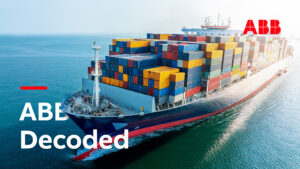- In the latest ABB Decoded podcast, Eero Lehtovaara, Head of Regulatory and Public Affairs, ABB Marine & Ports, discusses multiple options to make shipping more sustainable
- Long time captain Lehtovaara shares his insights on how digitalization and automation can support shipping to become cleaner, safer and more predictable
- Podcast explores multiple technologies helping to decarbonize the marine sector
29 September 2022 – The latest episode of ABB’s technology-focused podcast ABB Decoded discusses technologies for greener shipping, this year’s theme of the World Maritime Day on September 29. The theme provides an opportunity to focus on the importance of a sustainable maritime sector and engage in a global dialogue on the topic.

With more than 80 percent of all goods worldwide being transported via ships, and the number expected to significantly increase over the next few years, the imperative of the maritime transport sector to support global sustainability is clear. The marine industry has set ambitious sustainability and carbon neutrality targets in response to the global climate challenge. A key part of ABB’s 2030 sustainability strategy is to support customers and suppliers to reduce their emissions and achieve carbon neutrality in ABB’s own operations by 2030.
In the podcast Eero Lehtovaara, Head of Regulatory and Public Affairs, Marine & Ports at ABB, talks about increasing engine efficiency, the use of alternative energy sources like hydrogen or electricity, and how digital technologies can help create autonomous solutions to support greener shipping. In addition, he discusses the importance of evolving technologies in line with changing marine regulations.
Lehtovaara is in a unique position within ABB Marine & Ports as the internal and external focal point between maritime technology and regulation, bringing understanding between stakeholders in both areas. He is also ABB’s representative to a number of EU and global maritime agencies and NGOs.
“The marine industry is aiming for higher efficiency, reliability, predictability, and utilizing more information gained from digital technologies,” explains Lehtovaara. He expects a broad variety of solutions will play a role in reaching these ambitions. For instance, new technologies that are able to increase energy efficiency of ships, as well as the production and uptake of low-carbon marine fuels and the technologies to produce such fuels, are important for greener shipping.
As reliable and accessible alternative fuels are being developed, existing technologies are already available to increase the energy efficiency along with electrifying the maritime industry. Lehtovaara explains how digitalization brings forward the possibility to use data and information to further enhance the capabilities of the technologies that are already available. For example, digitalization enhancements to reduce turn-around times in ports can also contribute to the greening of shipping, by promoting and enabling optimization of resource and energy use.
Speaking about the current state of the marine sector, in the podcast Lehtovaara shares, “It’s an extremely interesting phase that we’re living in the maritime industry at the moment. I would say that really using information to the benefit of all the stakeholders is one of the biggest things that is still to come. The overall management of the big picture is really reliant on data. How we manage that data, how we process that data, and how the shipping companies are using that in their systems is something that’s very much going on at the moment and is very much dependent on the regulatory framework.”
The podcast concludes with Lehtovaara summarizing the critical importance of the relationship between the industry and the regulators and the need for open dialogue between the two. “We need to have a common understanding as an industry as a whole, including the regulators, on what technologies can do, what technologies are coming and where do we find the gaps in the regulatory setup that we need to work together with.”
ABB (ABBN: SIX Swiss Ex) is a leading global technology company that energizes the transformation of society and industry to achieve a more productive, sustainable future. By connecting software to its electrification, robotics, automation and motion portfolio, ABB pushes the boundaries of technology to drive performance to new levels. With a history of excellence stretching back more than 130 years, ABB’s success is driven by about 105,000 talented employees in over 100 countries. www.abb.com
